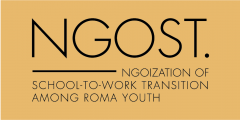NGOization of school-to-work transition among Roma youth (NGOST)

Project description
NGOST was a 24-month comparative research project conducted in three EU countries: Hungary, Slovakia and Spain. It aimed at critically examining policies and programmes that support school-to-work transition (STWT) reaching out to Roma youth. It focused particularly on the ‘NGOization’ of STWT programmes, that is the delegation of state functions to private entities, as a technique of neoliberal governance of minorities.
NGOST’s key objectives were:
- To critically examine policies and programmes related to school-to-work transition (STWT)
- To conduct a cross-country comparison of the development of STWT regimes, their focus and/or outreach to Roma youth, and the role of non-state actors (NGOs) in their operation.
- To investigate local practices of STWT through NGOs’ actions, and gauge their impact, with a particular focus on the labour market opportunities and STWT experiences of Roma young people themselves.
- To elaborate theoretical and analytical frames to reflect on public policies dealing with the social inclusion of vulnerable minorities - particularly the Roma - through labour market inclusion.
The negative effects of the recent global economic crisis and its aftermaths had a disproportionately adverse effect on young people’s labour market opportunities, particularly those from ethnic minorities, such as the Roma. Investigating NGOization through an ethnographic lens, NGOST offered insight into how the withdrawal of state institutions and the massive presence of non-governmental organisations in the STWT programmes, and the corresponding neoliberal ethos of activation and self-responsibilisation, shape young Roma people’s chances on the labour market and their perceptions thereof. The case studies from three EU countires followed the three levels of inquiry: policies/programmes, key players’ (institutions and organisations) actions and beneficiaries’ biographical experiences.
Methodology and field sites
The project relied on a qualitative research design, complemented with quantitative data collection. Fieldwork included participatory observation both in Roma communities and in institutions and non-governmental entities, coupled with in-depth interviews and focus group discussions with decision makers, workers and programme beneficiaries. Also, focus group discussions were organised in parallel with a brief survey administered to all the contacted workers.
Cross-country comparison allowed to analyse how different school-to-work ‘transition regimes’ contribute to the governance of ethnic minorities in diverse manners within the neoliberal paradigm. Each country’s transition system has distinctive features and internal logics. STWT research tended to emphasise the need to study the transition experiences of diverse social groups, among others, ethnic minority groups, and furthermore to explore within-group differences in the transition processes and outcomes. Nevertheless very few, if any, empirical studies had been conducted so far, that centre on non-immigrant ethnic minority groups. NGOST comparative research project aimed to fill this gap.
Project brochure
 |
This project has received funding from the European Union’s Horizon 2020 research and innovation programme under the Marie Sklodowska-Curie grant agreement No 845196. |
